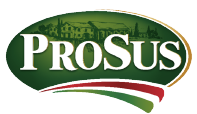

The feeding of pigs is essential for obtaining an excellent product: high quality corn, barley and wheat
are at the base of the natural feed for pigs.
This, together with respect for the animal welfare and the constant commitment to research and
improvement of agricultural processes, guarantees the higher quality standards of pork.
Starting from these bases, with the ownership of the slaughtering, processing and maturing plants,
ProSus naturally manages to cover the entire production chain of its 100% Italian
meats and today it can vaunt of being one of the most successful companies in pork processing
and zootechnics. Perfect combination of modern technology and all the care of tradition.
are at the base of the natural feed for pigs.
This, together with respect for the animal welfare and the constant commitment to research and
improvement of agricultural processes, guarantees the higher quality standards of pork.
Starting from these bases, with the ownership of the slaughtering, processing and maturing plants,
ProSus naturally manages to cover the entire production chain of its 100% Italian
meats and today it can vaunt of being one of the most successful companies in pork processing
and zootechnics. Perfect combination of modern technology and all the care of tradition.



65 farmers who cultivate cereals
on their fields for feeding pigs.
on their fields for feeding pigs.




All pigs given to ProSus were born and
bred in Italy in compliance to the production protocols
of the PDO Parma and San Daniele.
bred in Italy in compliance to the production protocols
of the PDO Parma and San Daniele.




Each stage of the processing is followed
and tracked on an IT level in all
the 3 production plants.
and tracked on an IT level in all
the 3 production plants.





ProSus has developed a biogas plant
fed with slaughter by-products,
in addition to a cogeneration plant.
Even most farms associated have biogas
plants for the production of energy
from renewable sources.
fed with slaughter by-products,
in addition to a cogeneration plant.
Even most farms associated have biogas
plants for the production of energy
from renewable sources.




Each batch of meat has its own code
that follows it until delivery to the customer
and allows you to trace the origin.
that follows it until delivery to the customer
and allows you to trace the origin.
Recently the company has implemented the project of its own certified protocol of production, even more
restrictive than the regulations in force, in order to guarantee the maximum welfare of the animals
and therefore the best quality of the meat.
restrictive than the regulations in force, in order to guarantee the maximum welfare of the animals
and therefore the best quality of the meat.
ANIMAL WELFARE:
All members that supply pigs to the slaughterhouse must guarantee respectful and dignified breeding conditions for pigs; also the use of veterinary drugs, if necessary, is always conscious and responsible way under the supervision of the National Health Service. The stables must be sustainable, never oversized from a numerical point of view and with a non-invasive environmental impact. Animals must have adequate space to move freely and enrichment materials to play and root.
TRANSPORT:
They are entrusted to professionals and are organized to ensure maximum efficiency, in compliance with the laws and regulations in force. The duration of trips must always be maximum 4 hours. The vehicles must be washed and sterilized after each unloading in the slaughterhouse and before entering the farms.
SLAUGHTERING:
In the next months, Prosus will open the new stalls for pigs, enlarging the spaces and optimizing the procedures to receive and manage the stay of the pigs since the arrival at the slaughterhouse: wider pens, modern moving systems to avoid any useless stress or trauma. Each operation is followed by veterinarians present during the entire working round.










